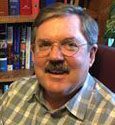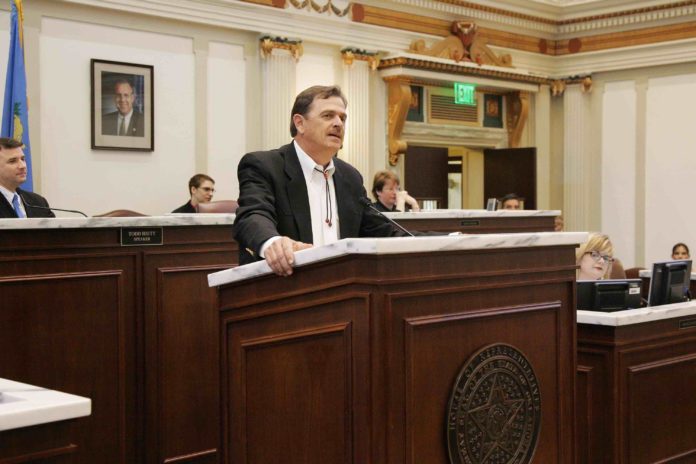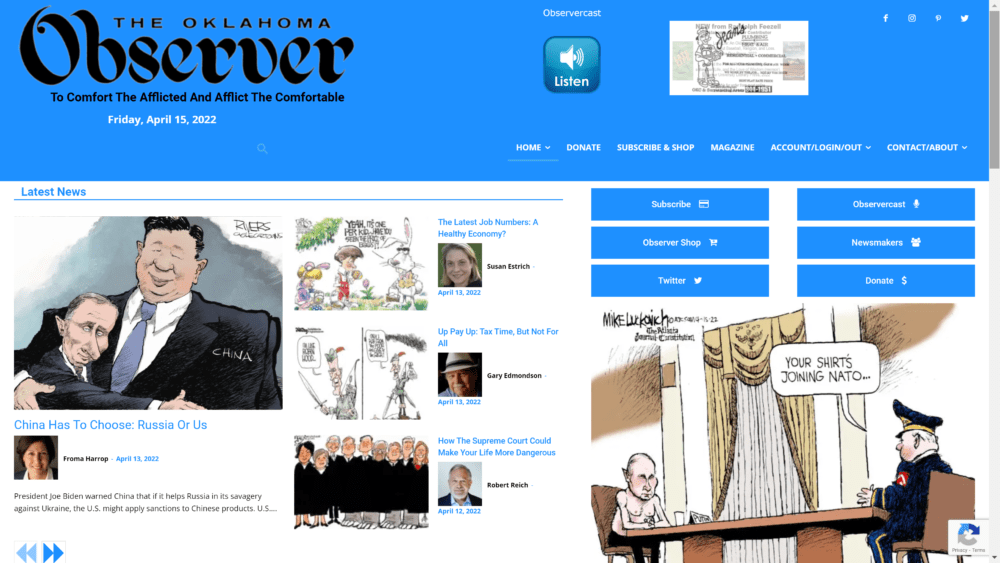BY MIKE W. RAY
 Like Icarus of Greek mythology, former state Rep. Mike Mass flew too high and plummeted to earth with a shattering thud. The Hartshorne Democrat tells the unvarnished story of his rise and dramatic fall from controller of the state’s purse strings and chairman of one of Oklahoma’s political parties to federal convict in Beneath the Vines [323 pages, paperback, Tate Publishing].
Like Icarus of Greek mythology, former state Rep. Mike Mass flew too high and plummeted to earth with a shattering thud. The Hartshorne Democrat tells the unvarnished story of his rise and dramatic fall from controller of the state’s purse strings and chairman of one of Oklahoma’s political parties to federal convict in Beneath the Vines [323 pages, paperback, Tate Publishing].
If confession is indeed good for the soul, Mass should be sleeping much better at night these days because he bares all in this memoir.
Mass uses pseudonyms for several characters in his book, but anyone who’s familiar with the politics of that time [1991-2009] will recognize the individuals.
CHILDHOOD
Mass recounts his hardscrabble upbringing in rural Pittsburg County, where his parents reared eight children [four boys and four girls] in a two-bedroom house on a couple of acres east of Hartshorne, which is about 15 miles east of McAlester.
“There was one bathroom and no air-conditioning, and our water came from a well with a pump house,” he relates. “We didn’t take vacations, nor did we go to the movies or eat out.”
As a child, his shoes had cardboard inserts, and while he was growing up, the only meat the family ate was squirrel or venison they hunted and shot.
His mother was a devout member of the Church of Christ. His father’s parents were Catholic Italian immigrants.
His father, Fred Mass Jr., was a strict disciplinarian who worked at the Army Ammunition Plant in Pittsburg County and owned some acreage on which he raised cucumbers for sale to a pickling company in Calvin, in Hughes County. The title of Mass’s book comes from his dad’s warning to his children that when harvesting the “cukes” they should look beneath the vines because a spider or snake might be lurking there.
Mass was 33 when his father died from a heart attack at age 59, yet belatedly Mass realized that he had “never uttered the words ‘I love you, Dad.’”
POLITICAL CAREER
After a series of jobs, Mass decided in 1990 to seek public office. “I had a sincere desire to help our little corner of Southeast Oklahoma,” he writes. The small towns around which he grew up “fell victim to the super stores that began cropping up in the larger towns, leaving small-town Oklahoma reduced to a bedroom community.”
Mass challenged and defeated an incumbent to capture the House District 17 seat. He quickly discovered that his constituents expected and demanded a lot. “I was following in the footsteps of giants” such as the late U.S. Sen. Robert S. Kerr and former U.S. House Speaker Carl Albert.
Mass says he received “about two or three dozen calls a day” at the Capitol. Oddly enough, he reports, most of the calls “weren’t about where their tax dollars were going,” Mass writes. “Their calls were on far more personal levels.”
Mass also was being “wined and dined” by Capitol lobbyists. “I was eating some stuff I couldn’t even pronounce!”
By the second session of his first two-year term in the Legislature, “the seeds of narcissism were slowly being planted.” During his political career, “I was a lot like the mockingbird, always seeking and getting attention,” Mass writes. And “Like a fool, I was beginning to believe my own press.”
Mass quickly advanced through the ranks to become chairman of the House Appropriations and Budget Committee. “Only in Oklahoma could you fail eighth-grade math and still qualify to preside over the entire state budget,” Mass quips.
In addition, Mass was elected chairman of the Oklahoma Democratic Party.
Although by now “full of myself,” Mass writes that he “never forgot about the folks in my [legislative] district.” In 1996, Mass and his roommate, a representative from an adjoining Southeastern Oklahoma district, introduced legislation that created the Rural Economic Action Plan to underwrite capital improvements such as water/sewer lines and street repairs for communities of 2,000 or fewer residents.
‘IF IT WEREN’T FOR BAD LUCK, I’D HAVE NO LUCK AT ALL … ’
Strains on his marriage were starting to grow. Mass was spending a lot of time in Oklahoma City while his wife was “trying to corral our four teenage children” back home. And although Mass had become “a whiz at math with the state’s budget,” his personal finances were “a wreck,” he acknowledges, and on weekends he began to “moonlight” at casinos in Bossier City, LA.
Also, the two-story house that Mass and his roommate rented near the Capitol when the Legislature was in session – a less-than-luxurious residence humorously referred to as “Mass Mansion” – began to be the subject of rumors of wild parties. However, when subpoenaed to appear before an Oklahoma County grand jury to respond to reports of nefarious alleged activities at the “mansion,” Mass said he testified that the social gatherings frequently netted thousands of dollars for charity.
Mass got caught up in a multicounty grand jury investigation into “ghost” employees at state agencies because he had recommended a long-time friend for a job at the LeFlore County Health Department who subsequently was indicted on a charge of receiving a state paycheck for work he didn’t perform.
When U.S. Rep. Wes Watkins announced in 2001 that he would not run for re-election after 10 terms in Congress, Mass quickly announced his bid for the post. But because of redistricting, congressional District 3 was incorporated into District 2, and Mass was trounced in the 2002 primary election by incumbent U.S. Rep. Brad Carson.
After that defeat, and no longer a state legislator, “Covering checks and rolling back loan payments came to a screeching halt” among the bankers to whom he owed money.
The District 17 House seat became open again in 2004 when the incumbent who had succeeded Mass ran for a state Senate seat. Mass filed for the open House seat and was elected again.
By this time he was utterly broke. “The gambling, along with my miserable luck at ranching, had forced me into bankruptcy.” And Mass was in trouble with the Internal Revenue Service for not paying taxes on his casino winnings.
In the November 2004 general election, Republicans seized control of the Oklahoma House of Representatives for the first time in eight decades.
When reports about “straw donors” who had contributed to the 1998 congressional campaign of a Democratic candidate began to emerge, it was learned that Mass had admitted accepting $10,000 from a powerful, long-time Oklahoma legislator and splitting it among several “straw donors” who in turn donated it to the candidate’s campaign. The Federal Election Commission fined Mass $25,000 for his role in the affair.
In 2005, as Mass was starting his seventh and final two-year term in the Legislature, vengeful Republicans prepared a resolution calling for Mass to be censored. Mass strolled to the podium in the House chamber and apologized publicly. Nevertheless, the GOP wasn’t satisfied; they wanted blood and planned to extract it the following Monday.
That weekend, though, one of their sanctimonious members “who had so passionately pleaded for restoration of dignity and honor to such an esteemed body” was himself charged with sexual battery. News about this “unfortunate incident” broke over the weekend, and by the time Mass returned to the Capitol on Monday “not one word was mentioned of my censorship,” he recalls.
In late May 2009 Mass was sentenced to two years in federal prison after pleading guilty to taking a $40,000 kickback to divert taxpayer funds to a gaming machine company and a dog food manufacturing company. He also acknowledged publicly that he was addicted to gambling.
Knowing that he was bound for prison, Mass “set out to get things in order” for his wife, Suzanne, who was “battling diabetes, degeneration of the spine, and a host of other illnesses that would prevent her from working.”
“I didn’t feel a bit sorry for myself; I deserved what I was getting,” Mass writes. “But the embarrassment I’d caused my family was unforgivable, not to them but to myself.”
LIFE BEHIND BARS
Mass entered the Federal Transfer Center in Oklahoma City in late June 2009, and he describes the conditions there as frequently bleak.
Criminal justice reform has been in the headlines in Oklahoma and nationally for several months. Mass is a staunch supporter of justice reform – not for himself, but for many of the young men with whom he was incarcerated. “Most of them were kids were very little family support, and most of them had a background of addiction,” he writes. They had been “hit with a baseball bat when they could have been handled with a switch.”
He also notes that with nearly 4,000 churches “preaching the Gospel,” Oklahoma, a state in the heart of the so-called Bible Belt, “leads the nation in cramming single mothers into prison.”
As he got acquainted with the young men confined in the FTC, “my disdain for pandering politicians like myself only grew.” Law-and-order legislation “serves as a re-election tool for most politician … it makes them appear tough.”
CONCLUSION
Mass’s state pension has been revoked, he no longer owns the house in which he lives, and he can no longer own, carry, or be in the vicinity of a squirrel gun. He can’t seek public office again – “although I wouldn’t if you paid me to” – and he is barred from voting because he’s a convicted felon.
However, he still has his credentials to preach. They’re recorded in a book in the Pittsburg County Courthouse.
Beneath the Vines is a page-turner. Mass says he wrote it, in longhand, over a two-year period while referencing notes he sent in response to letters he received from his eldest daughter, Elena, each and every day while he was in prison. The book is easy to read. Chapters toggle from Mass’ childhood to his time in the Legislature to his days in prison to his dealings with wheeler-dealers.
Mass, 64, is as good at writing a story as he is at telling one. He cemented his “aw, shucks” reputation in the Legislature the day he proclaimed, while debating against a bill on the House floor, “That dog won’t hunt!”
I was a member of the House staff for all but the last of Rep. Mass’ seven terms in the Legislature. I didn’t think much of the guy; I thought he was just a rowdy party-boy. But I gained an appreciation for the man after reading his memoir, and I recommend it to anyone who believes, as I do, in redemption.
– Mike W. Ray is media director for the state House Democratic Caucus. This posting originally appeared on his Facebook page: http://bit.ly/2b4EuEp









